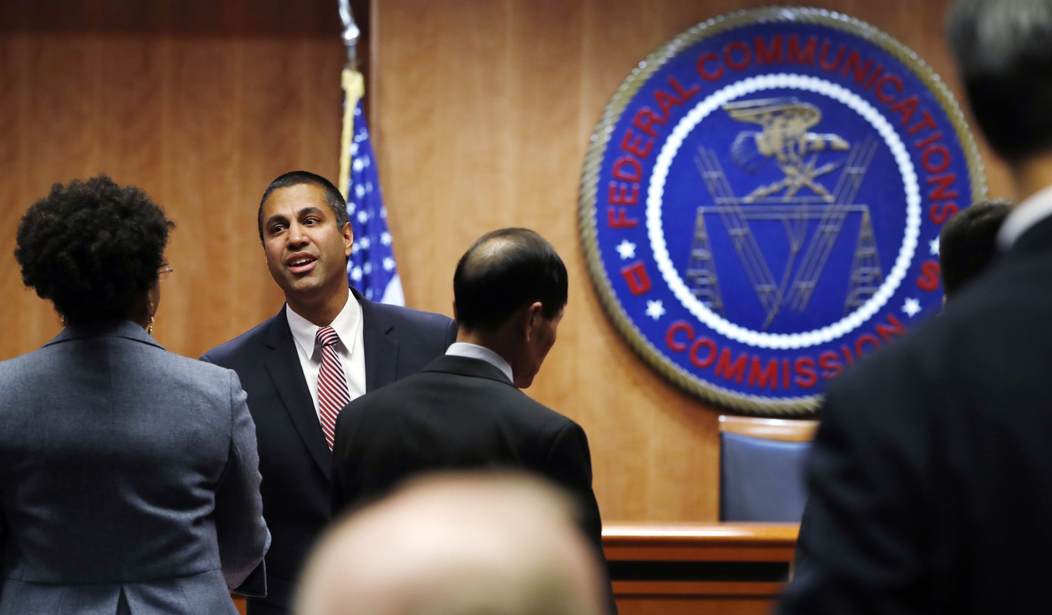For far too long, America’s wireless spectrum powering television, radio, and Internet has remained stuck in the 19th-century, powering the tried-and-true technology of yesteryear, but struggling to meet the latest demands of modern technology.
This reality is incredibly frustrating for me as a New York City resident. I am always in a time crunch and rely on my phone for e-mailing, streaming, and communicating on-the-go. My service is constantly stalled during busy hours and in high-trafficked areas like Port Authority and Penn Station. “Can you hear me now?” is all too often answered in the negative.
Last year, the Federal Communications Commission (FCC) began an "incentive auction" to repurpose the spectrum for the digital era. It permitted companies to sell their unneeded "beachwave airwaves" in exchange for another spot on the spectrum. This March, the Commission finished auctioning off that prime spacing to those in need of it the most. Over $15 billion in such repurposed spectrum was bought by some of the nation’s leading and aspiring mobile providers, including T-Mobile and DISH.
For people who rely on cellphone and wi-fi technology, much good will result from this FCC sale. Existing and prospective cellphone providers will now have access to powerful radio waves that can pierce through walls. This will mean less difficulty for many in making phone calls, streaming videos, and surfing the web. Better yet is that this change should cause surging competition, putting a ceiling on service costs.
Recommended
Yet, this repurposing plan is not without some immediate problems, particularly for people like me that live in metropolitan areas. To push this agenda forward, the government is imposing burdensome relocation costs on other broadcasters affected by these airwave changes. Many of their vulnerable channels did not receive any benefit from the FCC auction; yet this government-forced relocation regulation may force many loyal viewers like me to power off completely due to cost.
Congress is not completely blind to these concerns. It established a Television Broadcaster Relocation Fund to reimburse service and equipment costs for affected television stations. But FCC Chairman Ajit Pai has been clear: “if broadcasters are going to be harmless in this repack…Congress would have to provide additional funding."
I am not for bailouts for business enterprises. But if government forces costs on businesses by regulation, reimbursing for those costs is different.
The government made over $7 billion from its repurposing incentive auction. Before reckless bureaucrats spend all that money on wasteful pork, Congress should use some of those funds to compensate affected businesses.
Reps. Bill Flores (R-Texas) and Gene Green (D-Texas) introduced a bill to protect broadcasters from the many costs imposed by the government forced relocation mandate. Their "Radio Consumer Protection Act" will reimburse stations for many of these relocation costs over a five-year period. Other legislation from Sen. Jerry Moran (R-Kan.) and Rep. Frank Pallone (D-N.J.) will similarly solve the connectivity issue. It does not matter which bill Congress selects so long as net forced costs of the regulation are reduced.
Contrary to what Congress presumed initially, television is not the only industry affected by this government mandate. Radio stations, often operating on the same antennas, also suffer from the government imposed costs. Nearly 700 stations are at risk, including 100 stations in New York City alone, such as its popular CBS-FM (101.1). The fund created to ensure television stations do not go “dark” during the repack was not made available to local radio stations. If Congress does not fix this oversight, millions of local listeners could lose access to their favorite radio station.
The loss of radio signal would not just affect my enjoyment or the financial solvency of some stations, but also Americans' safety. Radio is still the fastest, most effective way to communicate breaking news to a wide audience.
Don't you think New Yorkers appreciated the heads-up broadcasters gave them recently during the Port Authority bomb scare? What about the help radio brought to victims in New Jersey before and during Hurricane Sandy?
Radio’s unmatched reliability is why rescue organizations like FEMA and the Red Cross depend on it. Just like local television, local radio stations should not be forced off the air due to the federal government’s forced spectrum reallocation to expand wireless service.
The interconnectivity of wireless broadband is a staple of modern life. From texting to streaming, the American people are demanding stronger and faster signals; however, Washington should not take away their TV and radio signals to achieve this objective. If a simple protection measure using some of the money the government gains from the reallocation is passed, the FCC's recent boost to wireless connection will be one of the most successful modern examples of Washington, D.C. working in the interests of the people.

























Join the conversation as a VIP Member